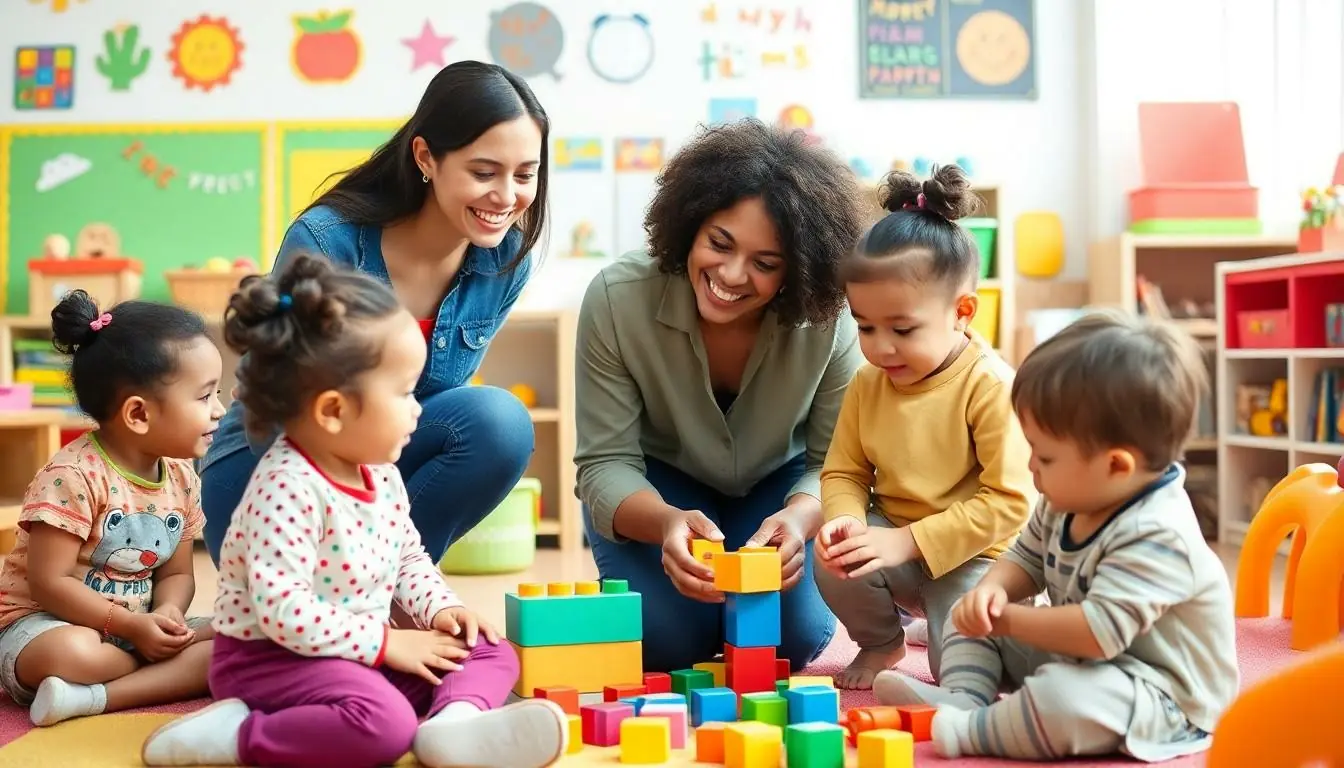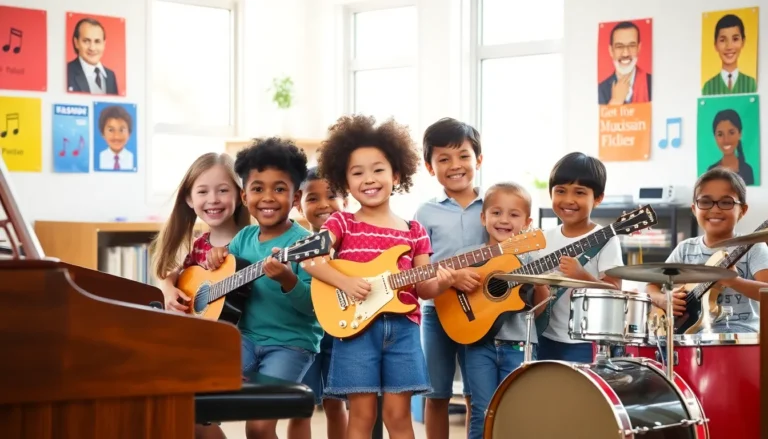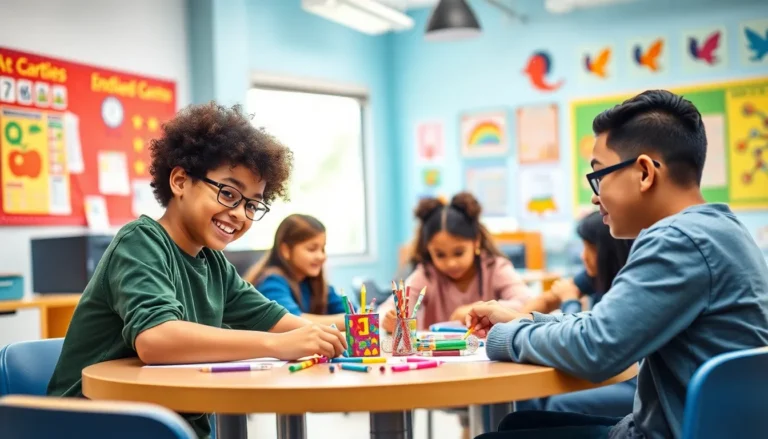Imagine a world where every child’s imagination runs wild and their curiosity knows no bounds. That’s the magic of early childhood education, and pursuing a Bachelor of Arts in this field can turn that dream into reality. By diving into this vibrant world, educators don’t just teach—they inspire tiny minds to explore, create, and grow.
With a blend of creativity and pedagogy, this degree equips individuals with the tools to shape the future, one finger paint masterpiece at a time. Plus, who wouldn’t want to be the superhero in a child’s life, armed with nothing but a storybook and a handful of glitter? It’s time to unlock the door to a fulfilling career that’s as rewarding as it is playful. Embrace the challenge and joy of nurturing young learners, and watch as they blossom under your guidance.
Table of Contents
ToggleOverview of Bachelor of Arts in Early Childhood Education
The Bachelor of Arts in Early Childhood Education focuses on educating young children, generally from birth to age eight. Students in this program learn about child development, pedagogy, and curriculum design tailored for early learners. Courses typically include subjects like language acquisition, cognitive development, and play-based learning strategies.
Graduates of this program play a crucial role in shaping children’s educational experiences. They develop the skills necessary to create nurturing and stimulating environments that encourage curiosity and creativity. Training involves practical experiences through internships or student teaching, providing firsthand insights into classroom dynamics.
Many programs emphasize the importance of family engagement and cultural responsiveness in early childhood settings. Students become adept at fostering relationships with families and communities, ensuring that education is inclusive and respectful of diversity. Knowledge in these areas enhances educators’ ability to meet diverse needs.
Job prospects for graduates are promising, with many roles available in public and private schools, childcare centers, and early intervention programs. Positions may include preschool teacher, daycare director, or curriculum coordinator. The demand for qualified early childhood educators continues to grow, especially as society recognizes the significance of foundational learning.
Ultimately, obtaining a Bachelor of Arts in Early Childhood Education equips individuals with the necessary tools to influence children’s lives positively. It fosters a commitment to lifelong learning, not only for educators but also for the children they inspire. The blend of academic knowledge and practical experience prepares graduates to make a meaningful difference in early years.
Curriculum and Coursework

The curriculum for a Bachelor of Arts in Early Childhood Education encompasses a variety of essential subjects and elective options that foster comprehensive knowledge and skills. Coursework integrates theory with practical application, preparing individuals for their roles as educators.
Core Subjects
Core subjects focus on critical areas such as child development, educational psychology, and pedagogy. Students explore developmental milestones, early learning theories, and effective teaching strategies that support children from birth to age eight. Classes cover play-based learning approaches, emphasizing hands-on experiences that cultivate creativity. Additionally, students study family engagement and cultural diversity, equipping them to collaborate with families and respect individual backgrounds in educational settings. This foundational knowledge is crucial for aspiring educators aiming to make significant impacts in early childhood environments.
Elective Options
Elective options allow students to tailor their educational experience based on specific interests and career goals. Courses might include curriculum design, special education, or technology integration in early learning. Additional topics such as environmental education, social-emotional development, and assessment techniques also feature prominently in the electives. These choices encourage personal growth and deeper understanding of specialized areas. Engaging in diverse electives, students can enhance their career prospects and gain expertise that meets the evolving needs of early childhood education.
Career Opportunities
Graduates with a Bachelor of Arts in Early Childhood Education find diverse career options across educational settings. Their training enables them to play essential roles in shaping young minds and supporting families.
Roles in Education
Preschool teacher roles focus on guiding children in their first formal learning experiences. Kindergarten teachers develop foundational skills in literacy and numeracy, working with students during a critical learning phase. Childcare administrators oversee education programs, ensuring compliance with regulations while fostering a nurturing environment. Special education teachers provide tailored support, helping children with developmental challenges succeed in academic settings. Educational consultants offer expert guidance to schools and families alike, enhancing early childhood programs.
Non-Educational Roles
Several career paths exist outside traditional educational settings. Early childhood program coordinators manage community outreach initiatives, promoting access to quality education. Advocacy roles in nonprofit organizations work to influence early childhood policies and funding. Child life specialists support children’s emotional well-being in hospital settings, creating therapeutic experiences. Research assistants contribute to studies on child development, helping shape best practices in education. Finally, content developers create educational materials that support early learning and effectively engage young learners.
Benefits of a Bachelor of Arts in Early Childhood Education
Pursuing a Bachelor of Arts in Early Childhood Education offers numerous advantages that extend beyond the classroom. Graduates gain both personal and professional growth while enhancing their ability to impact children’s lives positively.
Personal Development
Personal development flourishes through this degree program. Educators learn to adopt reflective practices, fostering self-awareness and emotional intelligence. Engaging with diverse families enhances cultural competence, enriching interpersonal skills. Creativity thrives as students explore innovative teaching methods, encouraging problem-solving abilities. Lifelong learning becomes a priority, as graduates commit to ongoing professional development and adaptation in a constantly evolving field.
Professional Growth
Professional growth accelerates with a Bachelor of Arts in Early Childhood Education. Graduates acquire essential skills tailored to meet the demands of early childhood education. Networking opportunities arise through internships and collaboration with experienced educators, expanding career prospects. Educators who complete this degree develop leadership qualities, preparing them for roles in program administration. The curriculum emphasizes evidence-based practices, equipping graduates to implement effective strategies and boost their employability in diverse educational settings.
Challenges in the Field
Educators in early childhood face significant challenges in their professional landscape. Budget constraints often limit resources available for classroom activities, impacting the quality of education. High staff turnover creates instability, making it difficult for children to build trusting relationships with their teachers.
Increasingly diverse classrooms require educators to adapt their teaching strategies. They must address varying cultural backgrounds, languages, and learning styles, which can be demanding but also rewarding. Lack of adequate training in special education poses another hurdle, as some children present unique needs that require specialized approaches.
Regulatory changes and compliance issues complicate the work environment for early childhood educators. Navigating these regulations demands time and effort, diverting attention from actual teaching. Additionally, high expectations from parents and administrators can contribute to stress, as educators strive to meet diverse expectations.
Limited salary prospects can deter individuals from entering or remaining in the field. Compensation may not reflect the level of education and dedication required, leading to job dissatisfaction. Burnout often affects teachers due to emotional labor tied to nurturing young minds in challenging situations.
Access to professional development and support varies widely across regions. Not all educators receive ongoing training opportunities, hindering their capacity to implement new strategies or stay updated on best practices. Balancing these challenges requires resilience and a commitment to lifelong learning to foster an effective educational experience for young learners.
A Bachelor of Arts in Early Childhood Education offers a pathway to a fulfilling career dedicated to shaping young minds. Graduates emerge with the skills and knowledge needed to create engaging learning environments that celebrate curiosity and creativity. As they navigate the challenges of the field they also embrace opportunities for personal and professional growth.
With a focus on lifelong learning and adaptability educators can thrive in diverse educational settings. This degree not only prepares individuals for various roles but also empowers them to make a lasting impact on children and families. The journey in early childhood education is not just a career choice; it’s a commitment to nurturing the next generation.





